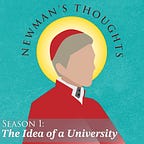Reading for Day 21: The Idea of a University, Discourse II, Theology a Branch of Knowledge § 8
Complete Recording of Discourse II @ Catholic Culture Audiobooks
Paperback with Introduction by Dr. Don Briel available @ Cluny Media
Full online text of The Idea of a University and other works by St. John Henry Newman are available @ the National Institute for Newman Studies’ Newman Reader
Such ideas of religion seem to me short of Monotheism; I do not impute them to this or that individual who belongs to the school which gives them currency; but what I read about the "gratification" of keeping pace in our scientific researches with "the Architect of Nature;" about the said gratification "giving a dignity and importance to the enjoyment of life," and teaching us that knowledge and our duties to society are the only earthly objects worth our notice, all this, I own it, Gentlemen, frightens me; nor is Dr. Maltby's address to the Deity sufficient to reassure me. I do not see much difference between avowing that there is no God, and implying that nothing definite can for certain be known about Him; and when I find Religious Education treated as the cultivation of sentiment, and Religious Belief as the accidental hue or posture of the mind, I am reluctantly but forcibly reminded of a very unpleasant page of Metaphysics, viz., of the relations between God and Nature insinuated by such philosophers as Hume. This acute, though most low-minded of speculators, in his inquiry concerning the Human Understanding, introduces, as is well known, Epicurus, that is, a teacher of atheism, delivering an harangue to the Athenian people, not indeed in defence, but in extenuation of that opinion. His object is to show that, whereas the atheistic view is nothing else than the repudiation of theory, and an accurate representation of phenomenon and fact, it cannot be dangerous, unless phenomenon and fact be dangerous. Epicurus is made to say, that the paralogism of philosophy has ever been that of arguing from Nature in behalf of something beyond Nature, greater than Nature; whereas, God, as he maintains, being known only through the visible world, our knowledge of Him is absolutely commensurate with our knowledge of it,—is nothing distinct from it,—is but a mode of viewing it. Hence it follows that, provided we admit, as we cannot help admitting, the phenomena of Nature and the world, it is only a question of words whether or not we go on to the hypothesis of a second Being, not visible but immaterial, parallel and coincident with Nature, to whom we give the name of God. "Allowing," he says, "the gods to be the authors of the existence or order of the universe, it follows that they possess that precise degree of power, intelligence, and benevolence, which appears in their workmanship; but nothing farther can be proved, except we call in the assistance of exaggeration and flattery to supply the defects of argument and reasoning. So far as the traces of any attributes, at present, appear, so far may we conclude these attributes to exist. The supposition of farther attributes is mere hypothesis; much more the supposition that, in distant periods of place and time, there has been, or will be, a more magnificent display of these attributes, and a scheme of administration more suitable to such imaginary virtues."
Here is a reasoner, who would not hesitate to deny that there is any distinct science or philosophy possible concerning the Supreme Being; since every single thing we know of Him is this or that or the other phenomenon, material or moral, which already falls under this or that natural science. In him then it would be only consistent to drop Theology in a course of University Education: but how is it consistent in any one who shrinks from his companionship? I am glad to see that the author, several times mentioned, is in opposition to Hume, in one sentence of the quotation I have made from his Discourse upon Science, deciding, as he does, that the phenomena of the material world are insufficient for the full exhibition of the Divine Attributes, and implying that they require a supplemental process to complete and harmonize their evidence. But is not this supplemental process a science? and if so, why not acknowledge its existence? If God is more than Nature, Theology claims a place among the sciences: but, on the other hand, if you are not sure of as much as this, how do you differ from Hume or Epicurus?




